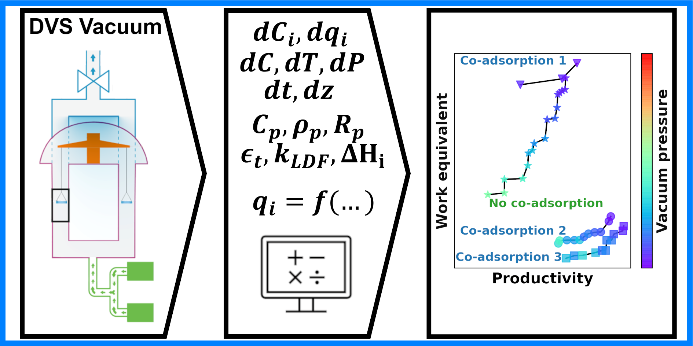
In an article published in Energy and Environmental Science, researchers from Heriot-Watt University benchmarked the performance of a carbon removal technology known as Direct Air Capture (DAC) via temperature vacuum swing adsorption in one of the most thorough studies on the topic to date. A considerable amount of data was collected to assess the effect of water vapour in the air on the technology. With the help of newly developed models, it was found that this effect is significant.
John Young, Enrique García-Díez, Susana Garcia, and Mijndert van der Spek from the Research Centre for Carbon Solutions were involved in the project, focussing on developing our understanding of the underlying science in order to simulate the technology more accurately. They presented the energy requirements of such a technology today by using a commercially available material in the analysis. This provides a target for more novel materials and processes to aim for in the future, and it helps to accelerate the deployment of carbon removal technologies at the scale required to meet our global net-zero greenhouse gas emissions targets.
The leading author of the study, John Young, said, “We hope that the detailed description and performance benchmark provided will be useful for both researchers developing new materials and policymakers assessing technology options for carbon removal”. Dr Mijndert van der Spek, Associate Professor at Heriot-Watt University added: “This work really pushes the boundary of our understanding of how CO2 adsorbs onto solid sorbents in humid air and finally provided the data needed to model direct air capture machines in detail”.
This work contributes to current RCCS leading efforts on bridging the gap between process engineering and materials design under the umbrella of the PrISMa project (https://prisma.hw.ac.uk ), which is funded through the ACT programme (Accelerating CCS Technologies, Horizon2020 Project No 294766).
Link to article: https://pubs.rsc.org/en/Content/ArticleLanding/2021/EE/D1EE01272J
The Research Centre for Carbon Solutions is an interdisciplinary world-leading engineering centre, inspiring and delivering innovation for the wider deployment of technologies needed to meet net-zero carbon targets. Utilising our extensive suite of research equipment (including x-ray CT scanner, core flood rig, sorption, and thermogravimetric analyzers, chromatography and spectrometry systems, along with several bespoke engineering rigs) we facilitate numerous multi-national research projects in CO2 Capture and Storage, CO2 Utilisation, Low Carbon Systems, and Negative Emissions Technologies.
The RCCS lab welcomes collaborative research projects, contract analysis, and open access use. For further information, facility tours, or equipment demonstrations, please contact the RCCS Laboratory Manager, Dr. Sean Higgins.

